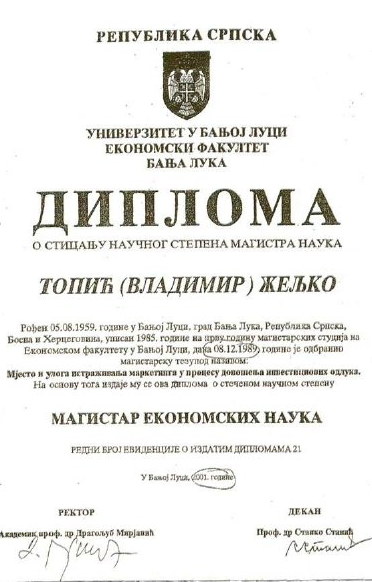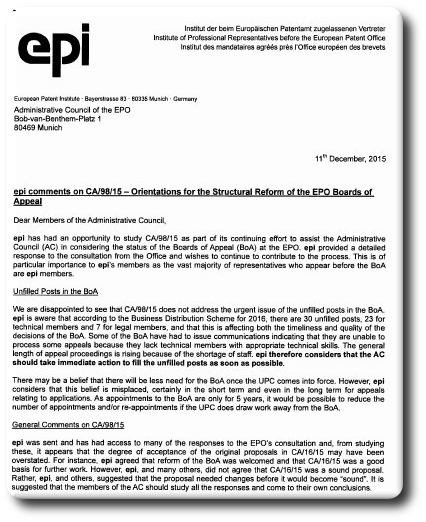
The German media are following the Master from Banja Luka with interest.
TWO DIFFERENT YEARS APPEAR ON TOPIĆ’S DEGREE CERTIFICATE
Written by: Franjo Dobrović
Saturday, 30 March 2013
In late February this year, the internet portal Tjedno received an official e-mail enquiry from the reputable German daily newspaper, the Süddeutsche Zeitung. It contained a request for facts and information relating to several articles which we had published about Željko Topić, the former Director of the State Intellectual Property Office of the Republic of Croatia (DZIV) and currently a Vice-President of the European Patent Office (EPO) whose headquarters are located in Munich.
The e-mail from the newspaper’s Belgrade office was signed by Mr. Florian Hassel, who introduced himself as the Balkans correspondent for the Süddeutsche Zeitung. We complied with his request and below we bring you the text of the e-mail received from the leading Bavarian daily newspaper (which is read throughout Germany):
“Dear Sir,
I am Florian Hassel, the Balkans correspondent for the Süddeutsche Zeitung, a leading German newspaper. Together with my colleague Christopher Schrader I have been following all of the charges and allegations against Mr. Željko Topić, an assistant director of the EPO in Munich.
On 11 April 2012, Franjo Dobrović published an article on Željko Topić, the then director of the State Intellectual Property Office (DZIV), in which he stated that there were six investigations or court proceedings being conducted against him.
We would be interested to know which attorney or judge conducted/has been conducting these investigations/court proceedings, as well as how many cases are involved.
Also, Mr. Dobrović wrote about a case heard in the European Court of Human Rights, in which it has been said that Mr Topić allegedly paid 500,000 HRK to the then Minister of Education Dragan Primorac in order to obtain his position at the DZIV. Could you please tell us which case Mr Dobrović is referring to?
Thirdly, Mr. Dobrović wrote that the Prime Minister, the Deputy Prime Minister and other ministers of the Croatian Government were in the possession of confidential documents concerning these and other allegations against Mr. Topić.
Would you be able to tell us more about who drafted these documents and when?
Finally, we would like to know what happened after the publication of your article in Croatia?
Was the investigation completed or stopped, and was there or will there be a lawsuit against Mr. Topić? I would also like to ask you to direct me to someone from the Croatian Government or the judiciary whom I could contact with further questions.
Any information or assistance that you provide to us will mean that every article published in Süddeutsche Zeitung will clearly state that the portal “Tjedno” was the first to publish information regarding this case.
Regards
Florian Hassel, Süddeutsche Zeitung, Correspondent for the Balkans”
The same journalist recently published an article in the Süddeutsche Zeitung describing how corruption still rules in Croatia [1]. This article attracted a lot of attention in the Croatian media. And as we have indicated above, prior to that he also expressed interest in the specific case of Željko Topić.
To remind our readers, Željko Topić, the former Director of the DZIV, voluntarily handed in his notice on 30 April 2012, only several months after having been re-appointed by the newly elected government of Zoran Milanović. He subsequently departed for Munich to take up a new position as a Vice-President of the European Patent Office (EPO). To begin with, it would be helpful to know who recommended Mr Topić for re-appointment and whose signature is to be found on the document submitted to the Prime Minister Zoran Milanović for initialling on 26 January 2012. It would also be worthwhile to hear the opinion of the EPO on the subject of Croatian copyright protection. Of particular interest is the information that the current director of the DZIV, Ljiljana Kuterovac, was appointed a couple of days ago as a member of the supervisory board of the EPO Academy in Munich for a term of three years!
In passing we mention that the description of Mr. Topić’s current position and other details about his person can be found on the official website of that international organisation: www.epo.org
According to the information that we received from our German journalist colleagues, Topić’s net monthly salary in his new job at EPO in Germany amounts to approximately 15,000 EUR.
JOVANOVIĆ CLAIMS THAT TOPIĆ IS PROTECTED BY JOSIPOVIĆ
Željko Topić acquired his master’s degree in Bosnia and Herzegovina. In Croatia the holder of a master’s degree is exempted from the requirement to sit the state examination, irrespective of whether or not the master’s degree is in any way relevant to the official duties performed in the civil service. In practice, the present case indicates a complete ignorance on the part of the former DZIV Director Topić concerning the basic principles governing the functioning of the civil service in Croatia. Failure to fulfil official obligations constitutes a serious violation of official duty as specified in detail in Article 99 of the Civil Servants Act [2].
Furthermore, in the case of an omission or inappropriate conduct by any member of staff, including the Director, the procedure concerning violations of official duty in the civil service is prescribed in detail. Disciplinary proceedings are to be instituted by the competent Minister of the state agency under whose remit the DZIV falls, which in this particular case is Minister Željko Jovanović.
The failings on the part of Minister Jovanović in relation to the supervision of the DZIV are not accidental. This assertion on our part is not baseless and without foundation because Minister Željko Jovanović of the Ministry of Science, Education and Sport of the Republic of Croatia has himself stated unofficially that Topić enjoys the protection of President Ivo Josipović and a political-legal clique in whose vanguard the state leadership itself stands. Jovanović ‘s statement was made in the middle of last year on the premises of the Croatian Social Democratic Party in Zagreb and in the presence of several witnesses, one of whom was a correspondent of the Deutsche Welle [i.e. the German public-sector international broadcasting service]. And while our honourable Minister sticks pedantically to the letter of the law, mercilessly dismissing primary and secondary school principals from office throughout the length and breadth of “our beautiful homeland” [3] merely because they have transgressed by enrolling one or two students more than they should have or due to other banalities, he does not dare to interfere with such a corrupt bigwig or to take any action concerning the operations of the DZIV.
However, Jovanović is not the only person entrusted with the task of providing cover for this “intellectual Taliban”. The lever of protection has been transferred from the Pantovčak [4] to Gajeva Street 30 in Zagreb, which is to say to the State Attorney’s Office of the Republic of Croatia (DORH) and the Bureau for the Suppression of Corruption and Organised Crime (USKOK). Despite the fact that they have been inundated with complaints of a manifestly serious nature against the former Director of the DZIV, these two institutions that are responsible for criminal prosecutions have thus far valiantly resisted the barrage of fire from the aggrieved citizens of the Republic of Croatia in their attempt to call both Željko Topić and the DZIV to account on the basis of substantially similar charges relating to activities of an inherently corrupt nature. According to the information provided by foreign legal experts, there is a distinct prospect of international criminal proceedings against Mladen Bajić, as well as his recently discovered “relative” Dinko Cvitan (their wives are related), because of the blatant obstruction of investigations and the damage which they are causing to Croatian citizens and to the common good in the present case [5].
Against this background nobody was surprised by the recent statement of the President of the Republic of Croatia that he would like to see his powers extended to include the right to personally nominate the State Attorney General. This was perceived by the general public and in legal circles as a demand to fulfil some kind of a “musical request” and, as we can see, it would be a perfectly fitting extension of the prevailing practices of patronage and clientelism. Perhaps he would like to extend the existing “family connections” which have already been exposed to other “family” members …
For those who are not so knowledgeable about the secrets of the Pantovčak, let it be noted that our honourable President Josipović recently started a similar initiative to impose his preferred candidate, in the person of his security advisor Saša Perković, as the head of the Security and Intelligence Agency (SOA). However, that proposal was blocked politically and met with forthright and unanimous rejection [by the government of Zoran Milanović].
MASTER’S DEGREE ISSUED 12 YEARS AFTER ORAL EXAMINATION
Željko Topić, being an economist who completed all of his academic studies, including the “famous” master’s degree, in Banja Luka, submitted the documents issued by the University of Banja Luka when taking up employment in the civil service of the Republic of Croatia. Some of these documents, in particular his “degree certificate”, were published by our portal in an article in June last year.
According to unofficial sources, as in other cases of DZIV supervision, the competent Ministry under the control of Željko Jovanović did not find anything amiss in this particular instance ! However, an analysis of the disputed documentation issued by the University of Banja Luka in the case of “Mr.Sc.” Topić, as well as several preliminary “field inquiries” on our part, have revealed a number of inconsistencies to which we would like draw attention. In order to assist the reader in understanding our analysis of the contentious master’s degree certificate which led to a complaint about Željko Topić being submitted to the Ministry of Science, Education and Sports, we have published this document alongside the present text for reference.
Let’s go through the details one step at a time …
- Two different years, i.e. dates, are indicated on the degree certificate.
- One year is indicated as the date of the oral examination. The year of issue is different, with no indication of the precise date on which the certificate was awarded.
- The difference between the date of the oral examination and the year in which the certificate was issued is 12 years.
- It is highly unusual that the certificate for a master’s degree which was completed in 1989 does not bear the attributes of the former Socialist Federative Republic of Yugoslavia (SFRY) but rather those of the Republika Srpska [an autonomous administrative region of Bosnia and Herzegovina].
- It remains unclear why the degree was issued in 2001, i.e. twelve years after the oral examination, and only indicates the year, but not the precise date on which the certificate was awarded.
- The thesis title stated on the certificate differs from the title stated on the thesis itself.
- Given that the date of the oral examination falls within the period of hard-line socialist self-management [i.e. in the SFRY], the title of the master’s thesis on the degree certificate sounds rather futuristic and is “outside of time and space”.
Taking account of the various points that are noted above, there seems to be little doubt that Topić’s degree certificate is a forgery. Perhaps the mysterious visitor to the Pantovčak, who commutes regularly between Banja Luka and the Presidential Palace once a month could provide more information about this matter and he might be able to assist us in arriving at the final answer to the open questions. On whose account this enigmatic gentleman travels between Banja Luka and Zagreb and who pays his monthly expenses, whether this comes from the national budget or from the Office of the President, these are things which are at present unknown. But let us hope that the official Visitor’s Book at the Presidential Palace will not disappear mysteriously as it did during the era of the former President, Stjepan Mesić.
We conclude by noting that it is not the role of the media to draw up a bill of indictment nor is it our intention to defame anyone. Our task is merely to draw attention to irregularities, to provide news coverage about them and to protect the public interest. We leave everything else, including the drawing of conclusions and the taking of appropriate measures, to the competent national institutions subject to the proviso that they function properly and in accordance with the fundamental principles of a constitutional republic governed by the rule of law.
Notes
[1] “Zaghafte Reformen reichen für den EU-Klubausweis”, 26 March 2013. [“Half-hearted reforms suffice to secure EU club membership”] http://www.sueddeutsche.de/politik/kroatien-zaghafte-reformen-reichen-fuer-den-eu-klubausweis-1.1634355
[2] Article 99 of the Croatian Civil Servants Act relates to “Severe Breaches of Official Duties”. Article 99(1)(j) categorises “the use of inauthentic documents to secure privileges in the service” as a severe violation of official duties. http://www.vsrh.hr/CustomPages/Static/HRV/Files/Legislation__Civil-Servants-Act.pdf
[3] An ironic reference to the Croatian national anthem.
[4] “Pantovčak” refers to the Presidential Palace in Zagreb.
[5] Mladen Bajić is the current State Attorney General and Dinko Cvitan is the current head of the Office for the Suppression of Corruption and Organised Crime (USKOK).
Based on the above, there’s still some cause for concern and for suspicion about the academic past of Topić, set aside many of those other issues. EPO has done itself a great disservice by adding Topić to its ranks. █
























 Content is available under CC-BY-SA
Content is available under CC-BY-SA